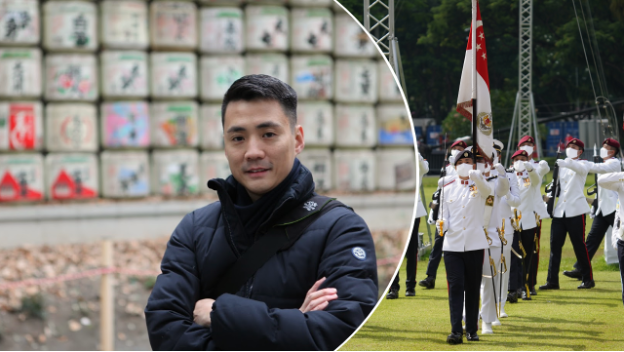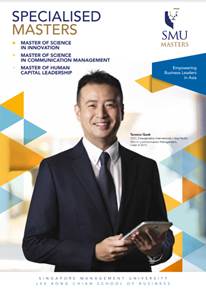
Due to COVID-19, the National Day celebrations had to be quite different, with traditional elements such as the state flag fly-past and fireworks displays taking place in different locations around Singapore. But the ceremonial parade at the Padang, a traditional favourite, remained and was commanded by SMU Master of Science in Innovation (MI) alumnus Nicholas Ong.
Nicholas, who holds the rank of Lieutenant Colonel in the Singapore Army, said it was an honour for him to lead men and women from the Singapore Armed Forces (SAF) and the Home Team in celebration of the nation’s birthday at the Padang. It was even more special because the parade performed a salute in tribute to our frontline fighters and essential workers who had contributed to the national fight against COVID-19.”
Nicholas’s journey in the SAF started in 2002 during his National Service (NS), where he was commissioned as an Artillery officer, before eventually chose to sign on as an Army Intelligence officer. “I enjoyed my time in NS and appreciated the military life. But before embarking on my career, I wanted a holistic education that would help train essential skills such as analytical thinking and problem solving These would serve me well as an intelligence officer, and so I decided to pursue my undergraduate studies at SMU,” he explained.
In 2009, Nicholas was part of the School of Accountancy’s pioneer batch of graduates in the city campus. “The skills I acquired during my time at SMU proved to be beneficial provided a strong foundation for me, and over the years, these have help me leapfrog straight from being a student to my current appointment,” he said.
“As an SAF officer, I have been tasked with many challenging assignments and different experiences. These opportunities have shaped my character in the various command, leadership and management roles that I have held,” Nicholas shared. These experiences further sharpened his competence in conceptual thinking especially in developing strategic operational plans and influencing people through coaching and mentoring, he added.
In 2016, Nicholas received further training at the SAF’s Goh Keng Swee Command and Staff College, and was also given the opportunity to pursue his Master’s degree. Having benefited from SMU’s unique pedagogy as an undergraduate, Nicholas decided to opt for his alma mater’s MI programme. “I like the way SMU classes are conducted in a very interactive way. And I also wanted to have access to a network of business leaders, entrepreneurs, and venture capitalists.”
The MI programme allowed him to tap into such a network, and he was able to conduct field research and talk to potential customers while working alongside experienced industry mentors and pitching business ideas to entrepreneurs and venture capitalists.
“The intelligence world is about solving problems, and it shares similar characteristics with the business world,” he explains. “You have to think critically, as well as learn when solutions work and fail. I found learning from VCs (venture capitalists) especially helpful, because they have seen businesses that survived and those that failed and were able to pinpoint problems and sharpen our ideas.”
For instance, for one MI group project, his team came up with an idea for a warehouse that could be rented to retailers who needed storage space for their goods. They pitched this idea at Babson College, the entrepreneurship-focused US business school that is the MI programme’s partner for its international residency segment. And the questions and feedback they received – from the kind of retailers this warehouse was targeting, to why it would surpass other available solutions – helped them to realise that the idea was not feasible.
“The questions and feedback probed us to think about whether we were trying to solve what we thought was a problem, or actually addressing a real problem. We went deeper, and after a few iterations developed a completely different business idea,” he says. “An important aspect of the programme was that it allowed us to make and learn from our mistakes. And we realised that we shouldn’t fall in love with an idea.”
Indeed, his key takeaways from the MI programme is this: A solution must solve a real problem, and ideas must be abandoned when they fail to work.
With NDP behind him and now back at his usual SAF duties as the commanding officer of the 11th Command, Control, Communications, Computers, and Intelligence Battalion, Nicholas is reflecting on how to apply his MI insights and skills to the next phase of his career.
“The programme has helped me to discover innovative opportunities within my own organisation. It has also equipped me to systematically assess the chance for success or the risks of failure. I enjoy creating something of value by examining areas where changes can be exploited.”
Speak to our Admissions Advisors
Lee Kong Chian School of Business
Postgraduate Admissions
Singapore Management University
Level 4, Postgraduate Programmes Office
50 Stamford Road, Singapore 178899
Tel: +65 6828 0882
